
September 9
1776 Congress renames the nation "United States of America": On this day the Continental Congress formally declares the name of the new nation to be the "United States" of America. This replaced the term "United Colonies," which had been in general use.
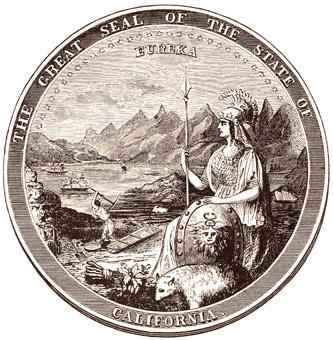
1850: California is admitted to the United States as a free state, giving the US a foothold on the Pacific. (Hittell)
[See: Countdown to Infamy: Pearl Harbor.]1914 World War I: Various:
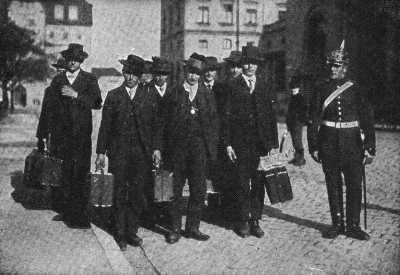
List Regiment (Sep 1-Oct 7): Hitler's regiment begins a short but intensive basic training program, which is held in the premises of a large public school on the Elizabeth Platz in Munich. Hitler receives the first uniform of his life; basic greenish-grey with an "RIR 16" sown in red unto the epaulettes and a red stripe down the side of the trousers. The trousers are tucked into new leather boots, topped by a thick leather belt around the waist of the uniform jacket. [For further details, Click here.]
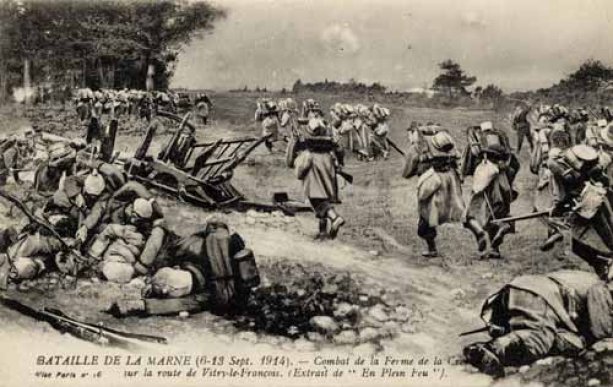
Lt. Col. Richard Hentsch, a trusted staff officer sent by Moltke to assess the situation on the Marne and issue orders if necessary, discovers that von Bulow's Second Army had been pushed back by the French Fifth, and that the BEF is moving into the gap between the German First and Second Armies. Hentsch then orders both armies to retreat to the Aisne River. Kluck retreats to prevent his army from being encircled.
Kluck, realizing defeat and looking to shift the blame for his tactical error, was only happy to retreat in order to prevent his army from being encircled. The First Battle of the Marne was not a conclusive one but was strategically a great victory for France. The Germans, who had considered themselves invincible, slowly began to comprehend that they had suffered a great defeat to an enemy whose fighting abilities they despised
Canadian Automobile Machine Gun Brigade created: the first fully mechanized unit in the British Army.
Russian Front: Russian troops are expelled from East Prussia, after the German Eighth Army defeats the Russian First Army in the First Battle of the Masurian Lakes.
U.S. Secretary of State Lansing demands recall of Austro-Hungarian ambassador:
On September 9, 1914, in a letter written to the government of the Austro-Hungarian Empire, United States Secretary of State Robert Lansing demands the recall of Constantin Dumba, the Austro-Hungarian ambassador in Washington, D.C. [For further details, Click here]

1915 World War I: Gefreiter Adolf Hitler's 16 Reserve Infantry Regiment continue to occupy a position, at Fromelles—pictured above in a drawing by Hitler—which is on a level field with water channels, willow trees and willow stalks; in the distance towards the enemy lines lies an insignificant wood with barbed wire entanglements. Under the direction of their defense-minded commander, Lieutenant General Gustav Scanzoni von Lichtenfels, the regiment works ceaselessly day and night to further fortify their position at Fromelles while fighting off repeated assaults by the enemy. [For further details, Click here.]
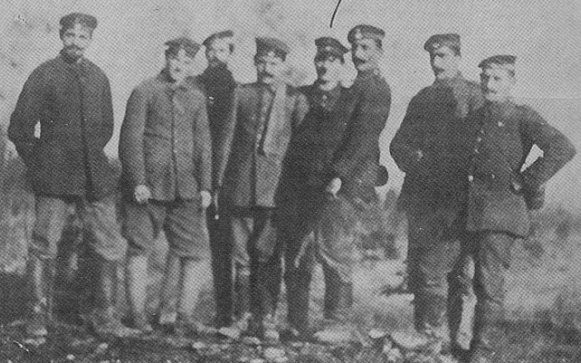
Hitler and his fellow dispatch runners
1915 World War I: War at Sea: Germany announces cessation of unlimited submarine warfare. The Germans, fearing US involvement in the war on the side of the Allies, agrees to pay indemnities and guarantees that submarines will not sink passenger liners without warning.
1916 World War I: Gefreiter Adolf Hitler endures trench warfare in Flanders (Artois) with 3 Company, 16 Reserve Infantry Regiment [List Regiment]. [For further details, Click here.]

1917 World War I (September 8-11): The List Regiment is taken off the Front by train for two months rest. Hitler loses his furry little companion on the trip:
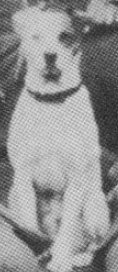
I remember, it was before we arrived at Colmar. The railway employee who coveted Foxl came again to our carriage and offered me two hundred marks. "You could offer me two hundred thousand, and you wouldn't get him!" When I left the train at Harpsheim, I suddenly noticed that the dog had disappeared ... I was desperate. The swine who stole my dog doesn't realize what he did to me.
[For further details, Click here.]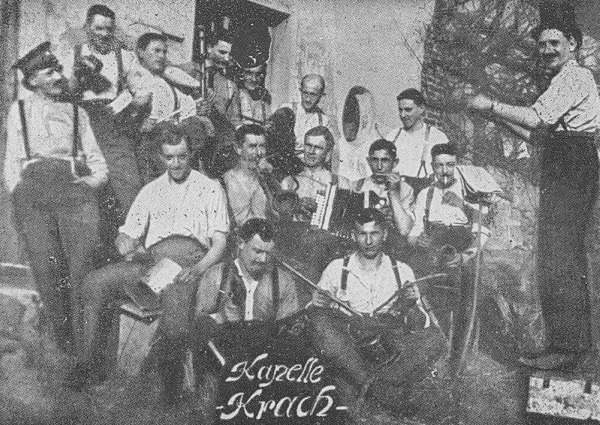
1918 World War I (August 21-September 27): Gefreiter Adolf Hitler attends a signals training course in Nuremberg. [For further details, Click here.]
1918 Birth: Thomas Ferebee: Hiroshima bombardier. After two years of flying school, Ferebee was assigned as a bombardier in the European theater and survived more than 62 bombing missions. In the summer of 1944, he was recruited by Colonel Paul Tibbets to be part of the 509th Composite Group which was formed to deliver the atomic bomb. He is best known for participating in the Enola Gay mission of August 6, 1945, where he was the bombardier who dropped an atomic bomb over Hiroshima. Ferebee stayed in the air force for 29 years.
1932 Spain: One year after a semiautonomous Catalonian Republic is proclaimed, the Spanish government and the Generalitat (Catalonian government) agree to a Statute of Autonomy. Francesc Macia is the first president of the first Generalitat in modern times. Note: This newly gained political autonomy will be lost when General Francisco Franco takes power in Spain in 1939, and brutally represses regional sentiments. (THP)
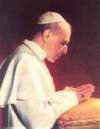
1933 Kirche und Reich: Papal Secretary of State Pacelli, at the request of Cardinal Bertram, puts in 'a word on behalf of those German Catholics' who are of Jewish descent and for this reason suffering 'social and economic difficulties.' The future Pope Pius XII makes no other mention of the "Jewish question." (THP)
1936 Goebbels accuses Czechoslovakia of providing secret bases for Soviet aircraft:
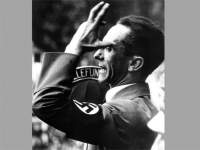
When Hitler secured power in 1933, fear of German aggression became generalized in eastern Central Europe. Benes ignored the possibility of a stronger Central European alliance system, remaining faithful to his Western policy. He did, however, seek the participation of the Soviet Union in an alliance to include France. (Benes's earlier attitude toward the Soviet regime had been one of caution.) In 1935 the Soviet Union signed treaties with France and Czechoslovakia. In essence, the treaties provided that the Soviet Union would come to Czechoslovakia's aid only if French assistance came first. In 1935 Benes succeeded Masaryk as president, and Prime Minister Milan Hodza took over the Ministry of Foreign Affairs. Hodza's efforts to strengthen alliances in Central Europe came too late.
1939 World War II: Various:
Poland: After three days of bitter fighting, German manpower tips the scales as the Polish Army launches a counterattack between Lodz and Warsaw, surprising the Germans. The German 4th Panzer Division is beaten off in the suburbs of Warsaw.
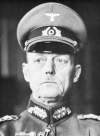
Army Group North received a welcome but premature message from Rundstedt's headquarters the evening of 8 September. According to Army Group South, the XVI Corps had taken Warsaw and established several crossings on the Vistula. The entry in the headquarters journal of Army Group North noted that "The drama is approaching its finale." The hope of a quick victory was dashed when it was learned that only one division had reached Warsaw and had been forced to withdraw, and that no crossing had been made along the Vistula.
From the German Ambassador in the Soviet Union. (Schulenburg) to the German Foreign Office:
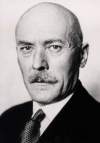
I have just received the following telephone message from Molotov: "I have received your communication regarding the entry of German troops into Warsaw. Please convey my congratulations and greetings to the German Reich Government. Molotov." From the Reich Foreign Minister Ribbentrop to the German Ambassador in the Soviet Schulenburg: "We are of course in accord with the Soviet Government that the validity of agreements arrived at in Moscow is not affected by local extension of our military operations. We must and will defeat the Polish Army wherever we meet it. Nothing in the Moscow arrangements is thereby altered. Military operations are progressing even beyond our expectations. The Polish Army, from all indications, is more or less in a state of dissolution. Under these circumstances, I consider it urgent that you resume the conversation with Molotov regarding the military intentions of the Soviet Government. It may be that the summoning of the Russian Military Attache to Moscow indicates that decisions are in preparation there. I would therefore ask you to speak to Molotov on the subject again in an appropriate manner and to wire result." From the German Ambassador in the Soviet Union (Schulenburg) to the German Foreign Office: "Molotov told me today at 3 p. m. that at a Soviet military action would take place within the next few days. The summoning of the Military Attache to Moscow was in fact connected with it. Numerous reservists would also be called." "The Red Army has admitted to Lieutenant General Koestring that the Soviet Union will intervene. Moreover, external evidence is multiplying of imminent Soviet military action: calling a large number of reservists up to 40 years of age, in particular technicians and physicians, sudden disappearance of important foods, preparation of schoolrooms as hospitals, curtailment in issuance of gasoline, and the like."
Kirche und Reich: Hitler issues an amnesty for Catholic priests accused of minor infractions of German law (See March 11, 1940)
[See: Was Adolf Hitler a Christian?]Holocaust: All Jewish men in the small Ruhr town of Gelsenkirchen are deported to the concentration camp at Sachsenhausen, near Berlin. The women and children are left to fend for themselves.
1940 World War II: Blitz: About 200 well escorted German bombers make another raid on London. Intercepted by the RAF, many drop their bombs before reaching the target.
[See: Why Did Hitler Lose The Battle of Britain?]1941 Rudolf Hess: Meeting with Lord Beaverbrook:
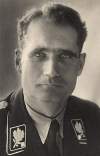
On 13th May 1941 the Daily Express published an article detailing the close relationship between the Duke of Hamilton and Rudolf Hess. The Duke's solicitor had a meeting with Godfrey Norris, the editor of the newspaper. The solicitor later reported that Norris appeared willing to print a retraction. While the discussion was taking place Lord Beaverbrook, the proprietor of the newspaper, arrived. He overruled his editor and stated that the newspaper would stick to its accusation. Beaverbrook added that he could prove that Sir Archibald Sinclair lied when he claimed in the House of Commons that Hamilton had never met Rudolf Hess. Understandably, the Duke of Hamilton withdrew his threat to sue the Daily Express. (Anne Chisholm and Michael Davie, Beaverbrook, A Life, pages 409-10).
[See: Why Would Hitler Approve Hess's Mission? - Did Adolf Hitler Approve Hess's Mission? - Was Rudolf Hess 'Crazy'?]1942 World War II: War with Japan: A submarine launched Japanese aircraft drops incendiary bombs near Brookings, Oregon, in an attempt to set fire to the forests. The plane, piloted by Nobuo Fujita, drops even more bombs 20 days later. Both raids are unsuccessful. This is the first and only time that the continental US has been bombed from the air. Note: In 1962, the city of Brookings will invite Fujita and his family for a visit as a gesture of goodwill, and to thank him for his bad aim.
1943 Various:
World War II: Italy: Allies land at Salerno and Taranto:
On this day in 1943, Operation Avalanche, the Allied land invasion of Salerno, and Operation Slapstick, the British airborne invasion of Taranto, both in southern Italy, are launched.
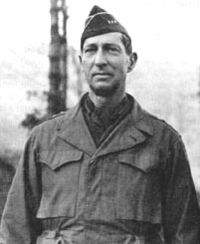
The U.S. 5th Army under Lt. Gen. Mark Clark landed along the Salerno coastline while British Commando units and their American counterparts, the U.S. Rangers, landed on the peninsula itself. Salerno had been chosen as the first site for invasion of the peninsula because it was the northern-most point to which the Allies could fly planes from its bases in Sicily, which they had already invaded and occupied. Rockets launched from landing craft provided cover, and the beach landings went relatively smoothly. It wasn't until two days later that the Germans, with some Italian troops coerced into service, mounted a heavy counterattack on the beachhead. But Clark called in the 82nd Airborne for support, and by the 15th, Salerno was in Allied hands.
Meanwhile, the British 1st Airborne Division, having successfully landed at Taranto, captured the airfield at Foggia.
[See: How Did the Pact of Steel Effect Germany and Italy?]Holocaust: A circular letter concerning receipt of fees for racial 'expert reports' states: "In the financial year 1942, 2,340.50 RM were received by the Kaiser Wilhelm Institute of Anthropology." Note: Assuming an average fee of 50 RM, approximately 50 'expert reports' were drawn up, each of them determining whether the Jew concerned was to live or to die. Macabre piece-work, indeed. (THP)
1944 World War II: General de Gaulle forms a provisional French government that includes Communists:
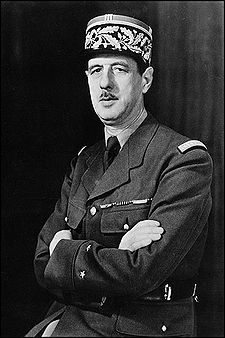
In his country, to the politicians of the left, a career officer who was a practicing Roman Catholic was not an immediately acceptable political leader, while to those on the right he was a rebel against Philippe Petain, a national hero and France's only field marshal. Broadcasts from London, the action of the Free French Forces, and the contacts of resistance groups in France either with his own organization or with those of the British secret services brought national recognition of his leadership. But full recognition by his allies came only after the liberation of Paris.
In London, de Gaulle's relations with the British government were never easy, and de Gaulle often added to the strain, at times through his own misjudgment or touchiness. In 1943 he moved his headquarters to Algiers, where he became president of the French Committee of National Liberation, at first jointly with General Henri Giraud. De Gaulle's successful campaign to edge Giraud out gave the world proof of his skill in political maneuver. On Sept. 9, 1944, he and his shadow government returned from Algiers to Paris. He headed two successive provisional governments but, on Jan. 20, 1946, abruptly resigned, apparently owing to irritation with the political parties forming the coalition government.
1945 World War II: War with Japan: The formal Japanese surrender in the China Theater takes place at 09:00 in a simple 20 minute ceremony in the auditorium of the Central Military Academy in Nanking:
The Emperor of Japan, the Japanese government and the Japanese Imperial General Headquarters, having recognized the complete military defeat of the Japanese military forces by the Allied forces and having surrendered unconditionally to the Supreme Commander for the Allied powers, having directed by his general order no.1 that the senior commanders and all ground, sea, air and auxiliary forces within China excluding Manchuria, Formosa and French Indo-China north of 16 degrees north latitude shall surrender to Generalissimo Chiang Kai-shek. We, the Japanese Commanders of all Japanese forces and auxiliaries in the areas named above, also recognizing the complete military defeat of the Japanese military forces by the Allied forces.
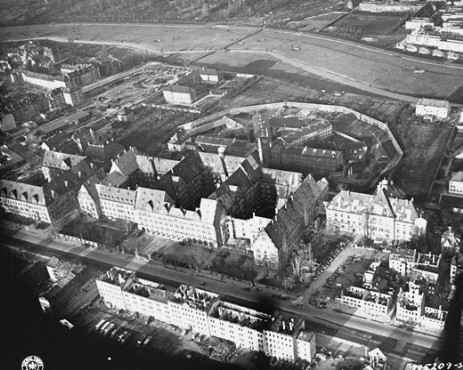
1946 Nuremberg Tribunal: The justices meet to discuss verdicts in the Major War Criminals Trial. (See: 30 September 1946)
1955: The Department of Defense Advisory Group on Special Capabilities votes 7 to 2 to approve the US Air Forces Vanguard proposal for launching a satellite, instead of the Army-Navy Project Orbiter plan.
[See: Wunderwaffen: Hitler's Deception and the History of Rocketry.]1969 Vietnam: Ho Chi Minh buried in Hanoi:
Funeral services, attended by 250,000 mourners, are held for Ho Chi Minh in Hanoi's Ba Dinh Square. Among those in attendance were Soviet Premier Aleksei Kosygin, Chinese Vice-Premier Li Hsien-nien and Prince Norodom Sihanouk of Cambodia. Ho had established the Indochinese Communist Party in 1929. In September 1945, as the defeated Japanese prepared to leave Vietnam, Ho declared Vietnamese independence from French colonial rule and announced the formation of the Democratic Republic of Vietnam. The French, attempting to reimpose colonial rule, soon clashed with Ho and his Viet Minh forces. [For further details, Click here]
1976 Death: Mao Zedong: who led the Chinese people through a long revolution and then ruled the nation's communist government from its establishment in 1949, dies. Along with V.I. Lenin and Joseph Stalin, Mao was one of the most significant communist figures of the Cold War. [For further details, Click here]
Edited by Levi Bookin (Copy editor)
levi.bookin@gmail.com



Click to join 3rdReichStudies



Disclaimer: This site includes diverse and controversial materials—such as excerpts from the writings of racists and anti-Semites—so that its readers can learn the nature and extent of hate and anti-Semitic discourse. It is our sincere belief that only the informed citizen can prevail over the ignorance of Racialist "thought." Far from approving these writings, this site condemns racism in all of its forms and manifestations.
Fair Use Notice: This site may contain copyrighted material the use of which has not always been specifically authorized by the copyright owner. We are making such material available in our efforts to advance understanding of historical, political, human rights, economic, democracy, scientific, environmental, and social justice issues, etc. We believe this constitutes a "fair use" of any such copyrighted material as provided for in section 107 of the US Copyright Law. In accordance with Title 17 U.S.C. Section 107, the material on this site is distributed without profit to those who have expressed a prior interest in receiving the included information for research and educational purposes. If you wish to use copyrighted material from this site for purposes of your own that go beyond 'fair use', you must obtain permission from the copyright owner.
Please Note: The list-owner and moderators of 3rdReichStudies are not responsible for, and do not necessarily approve of, the random ads placed on our pages by our web server. They are, unfortunately, the price one pays for a 'free' website.